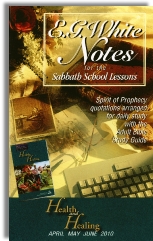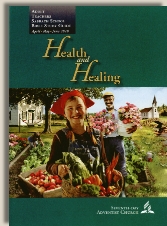|
||||||||||||||
Commentary on "The Power of Choice"
Day 5: Wednesday, April 7, 2010
Review
Today’s lesson looks at the consequences of our choices for our children and future generations. The text is Deuteronomy 30:10-19, where Moses commanded Israel to obey God’s laws so that He can bless them. They are warned that if they do not obey His commands, they will be banished from their land and destroyed.
As an example of how our choices can have serious multi-generational effects, the lesson lists problems with drinking alcohol. There are no benefits to light drinking, the author states, and any studies which claim that there are benefits are either flawed or corrupted by liquor industry money. In addition, even if the individual experiences no ill effects from drinking, his children are more likely to have drinking problems.
We are asked to read Deut. 30:10-19 carefully, and consider how our choices, especially about alcohol, can affect our children. “God gave us these health principles for our good. Do we have the faith to trust Him at His word?”
Observations
The topic of alcohol is an important one for us all, and cannot be trivialized. The Biblical approach is the one that will avoid doing harm. A careful reading of the Pentateuch will not reveal any laws forbidding alcoholic beverages. There are 15 references to wine in Deuteronomy, and some use words that certainly describe a fermented drink.
"If the place of worship where the Israelites were to carry their tithes (produce and livestock) was too far to carry the tithe, they were to exchange the tithe for money. They could take that money to their destination, and use it to purchase cattle, sheep, wine, or other fermented drink. They were to eat at the place of worship in the presence of the Lord, and rejoice." Deuteronomy 14:23-26
The Bible has many warnings about drunkenness, such as this one,
“Happy are you, O land, when your king is the son of the nobility, and your princes feast at the proper time, for strength, and not for drunkenness!” Ecclesiastes 10:17
However, a dispassionate Biblical study of the topic of drinking will reveal texts which celebrate the fruit of the vine as a gift of God, not to be abused.
“Bread is made for laughter, and wine gladdens life, and money answers everything.” Ecclesiastes 10:19
“You cause the grass to grow for the livestock and plants for man to cultivate, that he may bring forth food from the earth and wine that gladdens the heart of man, oil to make his face shine, and bread that sustains his heart.” Psalms 104:14, 15
Jesus and the New Testament writers often mentioned wine. Drunkenness was condemned along with gluttony, but He did not forbid drinking wine. At the wedding of Cana, Jesus turned the water into real wine, not mere grape juice. When His wine was served, the master of the feast told the bridegroom,
"Everyone serves the good wine first, and when people have drunk freely, then the poor wine. But you have kept the good wine until now.” John 2:10
The guests who had “drunk freely” would be much less critical of the wine’s quality—unless they had been drinking Welch’s communion wine. So the best was always served first.
In Jesus’ parables, He spoke of wine that was fermented:
“And no one puts new wine into old wineskins. If he does, the wine will burst the skins—and the wine is destroyed, and so are the skins. But new wine is for fresh wineskins.” Mark 2:22
Why would the wineskins break with the new wine? Because, new wine has just begun to ferment, and the expanding gases will break the used skins that are already stretched and brittle. Jesus was talking about the radical changes brought by the Gospel, which the Old Covenant cannot contain.
The Bible also does not recommend drinking, and we are told to shun anything which can harm others, or bring disgrace. There are many who choose not to drink, and some should never touch alcohol. This will be an individual matter. Believers are not to make food or drink a test of faith, as we see in Romans 14.
“For the kingdom of God is not a matter of eating and drinking but of righteousness and peace and joy in the Holy Spirit.” Romans 14:17
Prohibitions against food and drink promote the “elemental spirits of the world (Col. 2:20).” More important than protecting health is promoting the spirit of Gospel freedom, as Paul did for the legalistic Galatians:
“For freedom Christ has set us free; stand firm therefore, and do not submit again to a yoke of slavery.” Galatians 5:1
And to the Colossians:
“Therefore let no one pass judgment on you in questions of food and drink, or with regard to a festival or a new moon or a Sabbath.” Colossians 2:16
Summary
- The laws of Moses do no prohibit drinking fermented drinks.
- The Bible condemns drunkenness in both testaments.
- The Bible also presents wine as a gift of God that is not to be abused.
- Jesus made fermented wine, and brings fermentation into His parables.
- Any drinking or eating which harms our brother is to be avoided.
- The Gospel gives us great freedom in food and drink, and these are never to be used to test faith.
Copyright 2010 BibleStudiesForAdventists.com. All rights reserved. Revised April 5, 2010. This website is published by Life Assurance Ministries, Glendale, Arizona, USA, the publisher of Proclamation! Magazine. Contact email: BibleStudiesForAdventists@gmail.com.
The Sabbath School Bible Study Guide and the corresponding E.G. White Notes are published by Pacific Press Publishing Association, which is owned and operated by the Seventh-day Adventist church. The current quarter's editions are pictured above.
Official Adventist Resources
Standard Edition Study Guide Week 2
Teacher's Edition Study Guide Week 2
Easy Reading Edition Study Guide Week 2
Search the Complete Published Ellen G. White Writings


